Making the curriculum more engaging and relevant with school-wide homework initiatives at Bromsgrove International School Thailand
| THE concept of choosing a task to complete for homework is not new, but a school-wide policy was potentially bold, especially for an international school in Asia. In August 2015, Bromsgrove International School Thailand (BIST) relaunched their homework concept, producing a ‘library of learning’ and equipping students with the skills necessary to achieve highly in life as well as in their external exams. A school-wide initiative was launched, called ‘Extended Learning Opportunities (ELOs)’ for KS1, 2 and 3 and ‘Independent Learning Tasks (ILTs)’ for KS4 and 5. The tasks developed for each sector of the school fit with the curriculum and offer the appropriate level of challenge. In Early Years, children have a ‘Daily Diet’, consisting of core skills where repetition is key to success. Children also have an optional ‘Dessert Menu’ of open-ended tasks, designed to encourage them to explore their topic with family support. From Year 2, children develop their own dessert tasks, supporting them with the transition from parental support to self-motivated learning. These tasks are designed to engage and excite the younger learners. |
|
Hear from the families, parents, and students of Bromsgrove International School Thailand
“Our 5 year old son, Keane, is in the Reception class. We could not be more pleased with our decision to send him to BIST. He cannot wait to leave for school every morning and always starts the school day with a big smile. He loves learning and is excited to participate in every class activity. “The teachers truly care deeply for each student’s welfare and strive to make each student feel special. They have helped my son significantly; he has gained confidence, independence and love of learning. “Their new homework (ELOs) programme allows children to complete extended learning tasks at home. This has truly helped our son to develop his creativity, independence and responsibility. The programme encourages children to use their imagination, work independently and take time and care with their assignments. The children have an opportunity to deepen and broaden their understanding of what they learnt at school. The ELOs also allow parents to understand more about what their child is learning at school.” Nirada Wairatpanij, Flight attendant, Thai Airways International, and Kasin Wairatpanij, Dentist, Smiley Dental Clinic “When my daughter, Aimee a Year 2 BIST student, receives new assignments to work on at home, she shows interest and excitement. This reaction shows a positive attitude towards the activities. The ELO menu is a combination of some easily achieved tasks and some challenges, while the dessert activities are more stretching. The assigned activities boost my daughters’ self-esteem, challenge her to practise her skills, and provide a good opportunity for her to learn to become more responsible. Moreover, this is quality time for us to spend with our kid. We very much enjoy learning how much she has achieved from class during the period.” Duangkamon Soorangura, General Manager, International Education Promotions “I think the ELO system is good and gives a good structure to the person working on the tasks. It is good to give students the choice of doing what level of homework they are capable of. I usually complete the whole set of activities (three chilies). I try to do the most I can because the teacher doesn’t force me to do the work on that day. I have two weeks to try and challenge myself.” Jacob Byrne, Year 6 BIST student |
In the Primary school from Year 3 onwards, children spice up their daily diet by choosing ‘Chilli Tasks’ in Literacy and Maths, with the number of chillis indicating the complexity of the task, allowing children to self-differentiate and plan their home learning independently. Their achievements are celebrated at the end of each topic with a ‘Fantastic Finish’, giving parents the opportunity to see the amazing work that the students have completed. The positivity and engagement levels amongst the primary students cannot be ignored.
As students move into the secondary school, they are given a menu of Extended Learning Opportunities from each subject area and, similarly to the primary activities, they are differentiated by chillis. The expectation is that students complete a range of tasks throughout the year, with formative feedback given by teachers. The freedom that they have to manage their own time and their own learning has had a huge impact on confidence levels among students. Teachers regularly review the work they are completing and guide them towards challenging themselves and taking risks.
As students progress to the exam years, the approach essentially remains the same, but they are now referred to as ‘tasks’ to allow differentiation between the types of independent learning required in the external exam years. Secondary students are thus free to devise their home learning schedule, choosing tasks and recording their chosen Extended Learning Opportunities or Independent Learning Tasks to suit their own needs. Having had experience of managing their own time in previous year groups, they are now able to make good choices about how to use their time effectively.
As students move into the secondary school, they are given a menu of Extended Learning Opportunities from each subject area and, similarly to the primary activities, they are differentiated by chillis. The expectation is that students complete a range of tasks throughout the year, with formative feedback given by teachers. The freedom that they have to manage their own time and their own learning has had a huge impact on confidence levels among students. Teachers regularly review the work they are completing and guide them towards challenging themselves and taking risks.
As students progress to the exam years, the approach essentially remains the same, but they are now referred to as ‘tasks’ to allow differentiation between the types of independent learning required in the external exam years. Secondary students are thus free to devise their home learning schedule, choosing tasks and recording their chosen Extended Learning Opportunities or Independent Learning Tasks to suit their own needs. Having had experience of managing their own time in previous year groups, they are now able to make good choices about how to use their time effectively.
| To support students to record the tasks that they wish to complete, BIST designed a ‘Learning Journal’. This unique book, designed in-house, means that parents and teachers can work together to help students manage their time and think about their priorities, giving them vital soft skills to carry forward into adulthood. Student achievement is celebrated through demonstration sessions, displays and social media. Outstanding independent work is used as evidence of development of our ‘Learner Attributes’, and students can gain credits towards the Bromsgrove Award. In a Student Voice survey in October 2015, students were asked to vote between the ELOs/ILTs and traditional homework. 82% of children preferred the new style of home learning. In Secondary, 82.6% of teachers agreed or strongly agreed that it allowed more independence than traditional homework. Further evidence was gathered in the annual stakeholder survey, when 60% of students from across the school agreed that ‘the school provides effective opportunities for students to study and learn at home’. This is the first time that this question has received a positive response to home learning from the student body. Although, statistical analysis for such project is limited, it is clear that by the outcomes of the students, in both external and internal assessments, that this initiative has been successful. A reliable measure of impact is the annual NGRT test, 70% of pupils from Years 3-6 improved their standardised age score due to the increased focus on core skills in home learning. In addition, the number of A grades as AS Level increased from 20% to 44% in 2016 and our university destinations show a huge range from Natural Sciences at the University of Cambridge to Musical Theatre at the KSA Academy for Performing Arts, and can perhaps be attributed in part to the creativity and breadth that the new-style homework has afforded our students. |
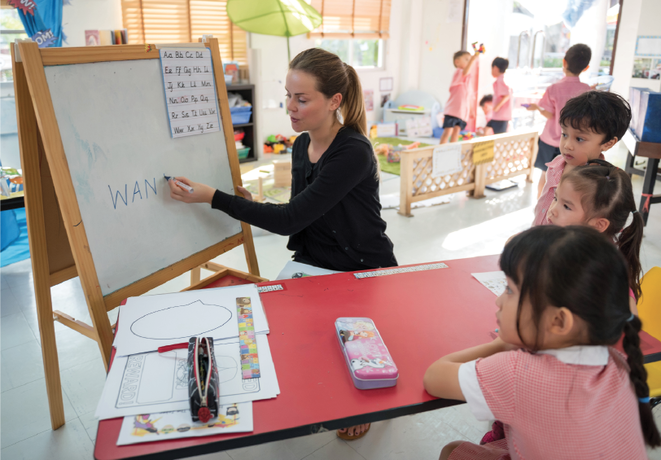
As a result of these innovative approaches to education, BIST was the only international school in Thailand to be shortlisted for the prestigious British International School Awards 2017 in the category of ‘Teaching Initiative of the Year’.
Schools across the world face the challenge of making curriculums engaging and relevant to the twenty-first century. Employers and universities emphasise that essential key skills need to be developed as well as knowledge and the application of knowledge. With this in mind BIST is confident they are heading in the right direction; students are happy, engaged and supported.
bromsgrove.ac.th
Schools across the world face the challenge of making curriculums engaging and relevant to the twenty-first century. Employers and universities emphasise that essential key skills need to be developed as well as knowledge and the application of knowledge. With this in mind BIST is confident they are heading in the right direction; students are happy, engaged and supported.
bromsgrove.ac.th

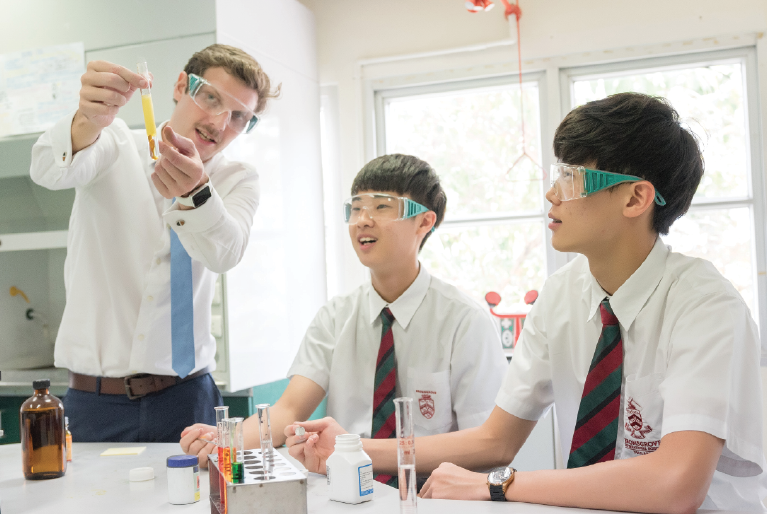



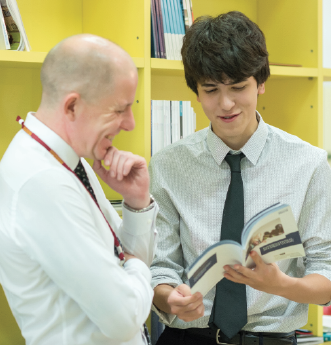
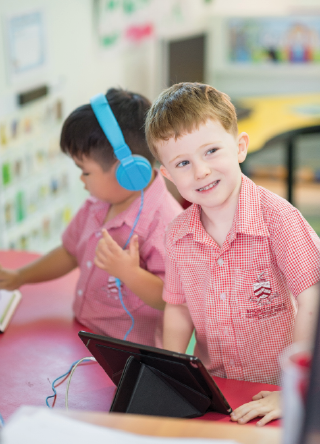

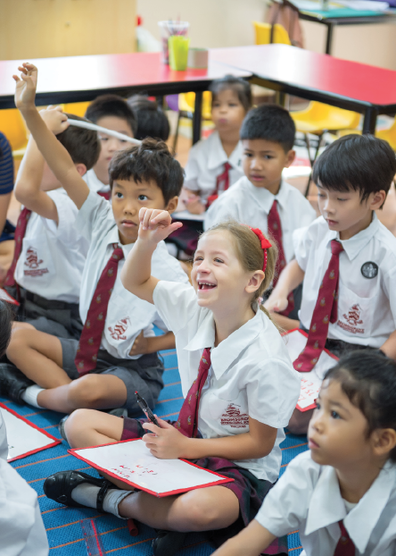
 RSS Feed
RSS Feed
















